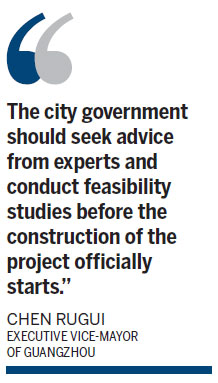

Guangzhou is seeking advice from specialists, both at home and from abroad, to help build a tunnel network to improve the city's rainwater drainage system.
The capital city of Guangdong province suffers frequent flooding during the rainy season.
The city is planning to invest more than 25 billion yuan ($4 billion) to construct an 86.42-km tunnel network in 10 years, according to a plan by the Guangzhou Bureau of Water Resources.
The project, which consists of a main tunnel and seven branches, will be more than 40 meters under ground.

The city's anti-flood capabilities will be increased 10-fold and the network is designed to handle more than 1.65 million cubic meters of floodwater.
Five drainage pump stations will also be built along the network.
Chen Rugui, executive vice-mayor of Guangzhou, said the network will play an important role in helping build the city into a new modern metropolis.
"But construction of the tunnel network involves different sectors, and the city government should seek advice from experts and conduct feasibility studies before the construction of the project officially starts," Chen told a planning consultation for the project, over which he presided, in Guangzhou on Sunday.
More than 20 experts, including four academics from the Chinese Academy of Engineering, attended the consultation.
Li Xiaojiang, head of the China Academy of Urban Planning and Design, said: "This project, to protect people from the ravages of nature, is much better than constructing a big street, a big square or other landmarks."
Yang Xiangping, a senior engineer and professor with Beijing Drainage Group Co Ltd, said the investment is actually not very expensive compared to investment in other infrastructure.
"Beijing's investment in sewage treatment plants alone has also reached more than 20 billion yuan in three years," Yang said.
Residents have also welcomed the project.
Wang Xiaowei, a housewife in Guangzhou's Liwan district, said she hoped relevant departments would start work as soon as possible.
"Many households in low-lying areas get flooded when downpours hit the city," she said.
However, Wang Hao, an academic from the Chinese Academy of Engineering, said the scale and standard of the project is on the conservative side and urged the city government to build an even bigger project.